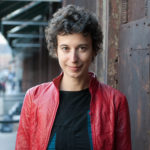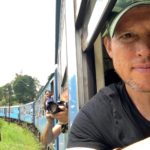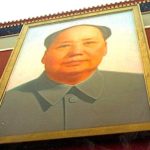Shahnaz Habib is the author of Airplane Mode, a cultural history of travel, and the translator of the Malayalam novel Jasmine Days, which won the JCB Prize 2018.
How did you get started traveling?
When I was a kid, my family would often take long-distance train journeys around India. We lived in the south Indian state of Kerala, so we often spent two or three days in the train as it ran across the Indian heartland. It was such a leisurely way to see the length and breadth of the country and I feel so grateful that this was my first taste of travel.
How did you get started writing?
One day in second grade, my friend and I made up a rhyming poem. I still remember how fun it was to skip around the schoolyard trying out words and verses. I wrote poetry and stories for a long time after that, but never really thought of myself as a writer. Years later in grad school, I was trying to salvage a failed photography project. My photos had come out terribly and a very wise mentor told me, “Write about it.” Writing that essay helped me rediscover the rewards of making meaning through writing. Lately, I have also been translating from my mother tongue of Malayalam to English.
What do you consider your first “break” as a writer?
This is not what is considered a break traditionally. But several years ago when I first returned to writing after the aforementioned failed photography project, I fell in with an amazing writing group full of South Asian women. We met once a week to read each other’s work and give feedback. To have an audience that gets you, to write for people who don’t need explanations about your culture and identity – that changed everything.
As a traveler and fact/story gatherer, what is your biggest challenge on the road?
For most of my life, my biggest challenge as a traveler was passportism. In my book, I wrote about this – the way people with Third World passports have to pay more and produce more documentation for getting visas and traveling to wealthier countries. This is one reason why there is such a preponderance of travel writing from Western perspectives. I now have a US passport and I continue to be amazed by how much easier international travel has become.
But I have new problems! Flying for more than a few hours is hard on my body. Jet lag takes a much bigger toll now than before, turbulence has suddenly become terrifying. I live in fear of noisy hotel rooms and the slightest trace of dust brings on violent allergies. My back is always aching. I guess what I am really saying is that I am middle-aged in a world where so much of travel infrastructure is built for healthy, able-bodied young people.
What is your biggest challenge in the research and writing process?
It’s not easy to find decolonized travel perspectives. So much of history, geography, cultural criticism, geopolitical analysis is written from the point of view of Western hegemony and supremacy. So often it takes a lot of digging to find the voices I trust for my research.
What is your biggest challenge from a business standpoint?
Having to do publicity when I would rather crawl under a shell.
Have you ever done other work to make ends meet?
Yes, I work full-time at a day job. I am a communications writer and writing teacher.
What travel authors or books might you recommend and/or have influenced you?
I would recommend everyone who writes about travel read Jamaica Kincaid’s A Small Place, a book about her native Antigua, its tourism industry, its postcolonial history and the ways in which certain tourist paradises offer one experience to visitors and another to the people who live there.
Some other favorites: Stories of the Sahara, by Sanmao, translated by Mike Fu; The Fly Trap, by Frederik Sjoberg, translated by Thomas Teal; An African in Greenland, by Tété-Michel Kpomassie, translated by James Kirkup
What advice and/or warnings would you give to someone who is considering going into travel writing?
I am not the right person for this – I don’t think of myself as a travel writer. I am writing essays and some of these are about places I travel to. I will say that I have never written about a place where I have not taken notes. Write down all your observations! Take more notes than you think you need. Do not rely on memory alone (see earlier: “middle age”).
What is the biggest reward of life as a travel writer?
My parents no longer disapprove of my travels.





